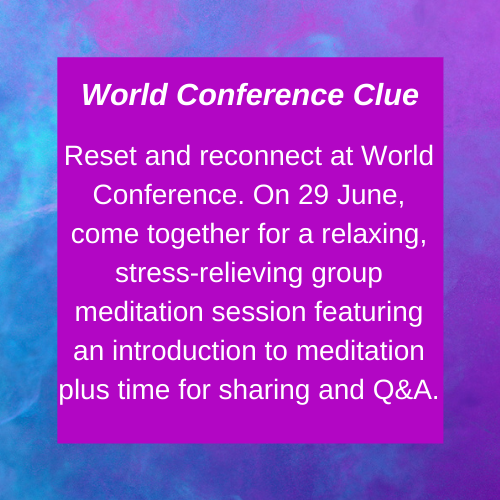Industry burnout, online interaction, the next generation of communicators and a new social capital ecosystem — these four topics were identified as some of the most pressing challenges and opportunities for innovation among communicators and will be featured at this year’s virtual IABC World Conference.
During the Quick Hit Showcase session (28 June, 3:20 p.m. PDT; 28 June, 11:20 p.m. BST; 29 June 8:20 a.m. AEST), four communicators will discuss their respective topics (shared below) during rapid-fire, 5-minute presentations. These speakers will lead engaging discussions that will positively impact the way you think, as well as your communication practice. Get to know them in the Q&A below.
- "Game-Changers: How Junior Communicators Are Ready to Change the World," by Mubashira Farooqi
- "Identifying Burnout Among Communicators," by Shaniek Parks
- "From Communication to Interaction," by Vip Sitaraman
- "A New Kind of Social Capital Ecosystem Is the Antidote to a COVID World" by Kylie Taylor
Why are you passionate about the topic you’re presenting?
MF: As a junior communicator, I’m passionate about seizing opportunities and uplifting others. Today’s junior communicators have a sense of the industry and the world that is changing the field — from a focus on social justice and trust, to social media as a tool for global success, we are changing the game!
VS: As a designer and business owner, I'm enthused by new opportunities and innovations in business communication. I came to understand the incredible power of interactive experiences while building Explica, my first news/media startup. I've always been amazed by the broader applications of innovative and engaging storytelling formats across industries.
KT: Communication professionals have the opportunity to lead positive change. If organizations are not cognizant of their social context and stakeholder expectations, they cannot succeed. Similarly, each time we help organizations meet their stakeholder expectations, we are helping bridge a gap, meet a higher societal standard, deliver a better product or service, and do so with less negative impacts.
SP: In 2020, I experienced burnout in the midst of the pandemic and wasn't aware it had happened because I was always happy in my role. I spoke with friends and colleagues and learned they were going through a similar experience. This sparked my interest and got me reading about the topic. I want to help communicators recognize burnout and take steps to avoid it in our world of "business unusual."
What has the last year taught you to value within the profession?
MF: As a communicator, the last year has taught me that transparency and accountability has become key for every organization. It’s important to stand true to your values and share that with your audience.
KT: The last year saw communication professionals recognized for the critical role they play in organizations. When lockdowns, working from home and travel restrictions became the norm, communicators knew the drill. We drew on our crisis communications training and experience to analyze the situation, understand what needed to be shared with whom and when, and then helped people navigate this new world and continue operating.
SP: In Jamaica, we have a saying: "Cow neva know di use ah him tail til' him lose it.” It means that you don't know what you have until it is no longer available to you. Therefore, you should appreciate and value things, people and experiences. Today, I place greater value on the camaraderie among communicators, including opportunities for learning and professional development. Pre-COVID, this camaraderie was organic and occurred when visiting each other's desks to bounce ideas or meet up at events. In this new normal, we have to be intentional about creating those spaces.
VS: Asynchronous communication has become a buzzword of the remote work era, but the same applies for content and communication. Given the choice between clicking on a 2-minute video and answering three simple multiple-choice poll questions to enter a raffle for a reward, a consumer is more likely to select the latter because it seems you are asking less of them, since there is no minimum time, idle moments or perceived downside. Non-traditional communication channels and media sometimes offer asymmetric upside and return on investment.
What drew you to becoming a communicator?
Mubashira Farooqi (MF): The power that communicators hold in creating positive change drew me to the field. As the team between an organization and its stakeholders, communicators are capable of creating messaging that can make positive change in the lives of others.
Vip Sitaraman (VS): Presenting has been one of my favorite activities since I was an elementary school kid in science fairs and speech/debate. I never expected to become a business communicator — I just happened to seek out freelance design gigs when I was 17, and things snowballed into a career since then!
Kylie Taylor (KT): It was a natural career choice as it combined a keen interest in research, writing and journalism; a love of studying politics, cultures and religions; and a curiosity about business and commerce.
Shaniek Parks (SP): I aimed to become a print journalist, but that changed after a class with a PR manager. She shared her varied and exciting experiences as a communication professional. I left the session believing communicators were storytellers and "kingmakers" behind the scenes, leveraging relationships to manage crises, building the reputation of organizations and bringing issues to the public's attention. I wanted a career with that impact — the rest is history!

Ready for some rapid-fire learning while making authentic connections? Add this session to your calendar, and register now to attend the virtual IABC World Conference 2021, 28–30 June.
Featuring Mubashira Farooqi, Vip Sitaraman, Kylie Taylor and Shaniek Parks